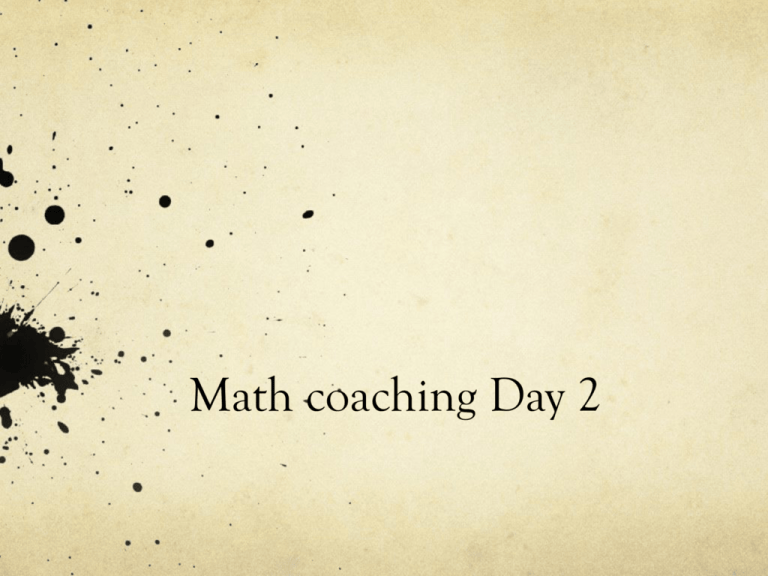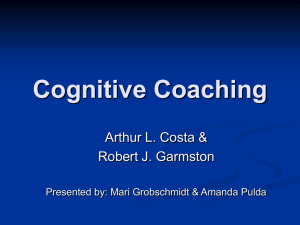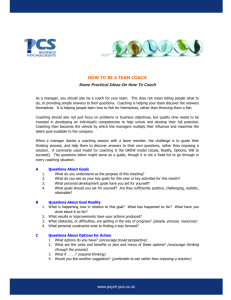Focus 3_Math Coaching_August, 2014
advertisement

Math coaching Day 2 Essential Question Reflection What are the characteristics of an effective coach, what do they need to know and be able to do? What's the Big Idea? Purpose for today Understanding Cognitive Coaching as one of the four support functions Understanding the five states of mind to build holonomy Understand the reflection conversation map with the essential coaching pattern of pausing, paraphrasing, pausing, and posing questions Reflection Turn to a neighbor and share strategies you used? 1. what is one thing that excited you? 2. What is one thing made you nervous, frustrated or challenged you? 3. What one thing do you want to learn more about? Key points for Coaching Benefits of coaching Requirements for coaching Four support functions Coaching Collaborating Consulting Evaluating Practice Five States of Mind HOLONOMY A Snapshot of Cognitive Coaching 5 States of Mind: Tools for disciplined choice making “Self development of personal efficacy requires mastery of knowledge and skills, attainable only through long hours of arduous work.” -A. Bandura (p. 126) Efficacy “Destiny is as destiny does. If you believe that you have no control, then you have no control.” -W. Roberts. Flexibility “Learn to do uncommon things in an uncommon manner. Learn to do things so thoroughly that no one can improve upon what has been done. Craftsmanship “The White people think the whole body is controlled by the brain. We have a word, umbelini (the whole intestines): that is what controls the body. My umbelini tells me what is going to happen: have you never experienced it?” -M. Tiso (Xhosa Tribe, South Africa) Consciousness “We’ve each been invited to this present moment by design. Our lives are joined together like the tiles of a mosaic; none of us contributes the whole of the picture, but each of us is necessary for its completion.” -K. Casey & M.Vanceberg Interdependence “We all have the extraordinary coded within us, waiting to be released.” -J. Houston (p. 124) “Within you right now is the power to do things you never dreamed possible. This power becomes available to you just as you can change your beliefs.” -M. Malts (p. 142) Goals of Cognitive Coaching Colleagues are encouraged to: Inquire Speculate Construct Meanings Self-evaluate Self-prescribe The Mediator’s Toolkit Paralanguage Response Behaviors Structuring Mediative Questioning Paralanguage Nonverbal & Verbal Cues Posture Gesture Inflection Pitch Volume Rate of Speech Language Choices Breathing Response Behaviors Silence (wait longer than you think you need to) Communicates respect Results in positive effect on cognitive processing Acknowledging (give verbal & nonverbal cues) Communicates that ideas have been heard Paraphrasing (stems) Acknowledge & Clarify Summarize & Organize Shift Focus Clarifying Providing Data & Resources Structuring A coach clearly communicates expectations about purposes and the use of such resources as time, space, and materials. Should be based on a common understanding of the purposes for the coaching, the roles the coach should play, time allotments, and placement of the coach. Mediative Questioning “It’s not the answers that enlighten us, but the questions.” Intentionally designed to engage and transform thinking and perspective. Questions must meet three criteria: Invitational in intonation and form Engage specific complex cognitive processes Address content that is either external or internal to the other person. Questioning & Feedback Toolbox Planning Conversation Observation Reflecting Conversation Homework Practice pausing, paraphrasing, and rapport Add questions that address the three criteria: Invitational in intonation and form Engage specific complex cognitive processes Address content that is either external or internal to the other person. Collect examples of States of Mind







